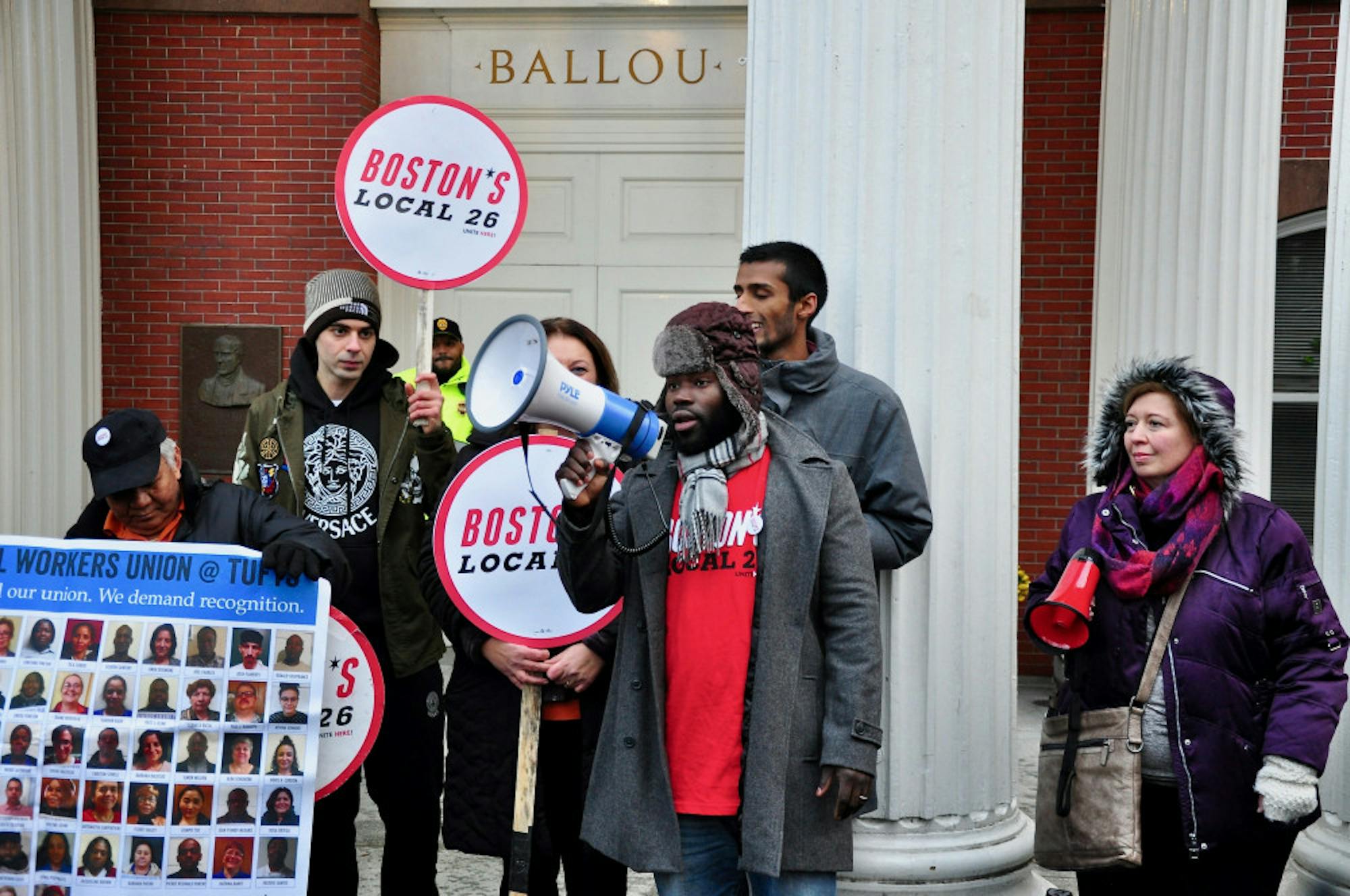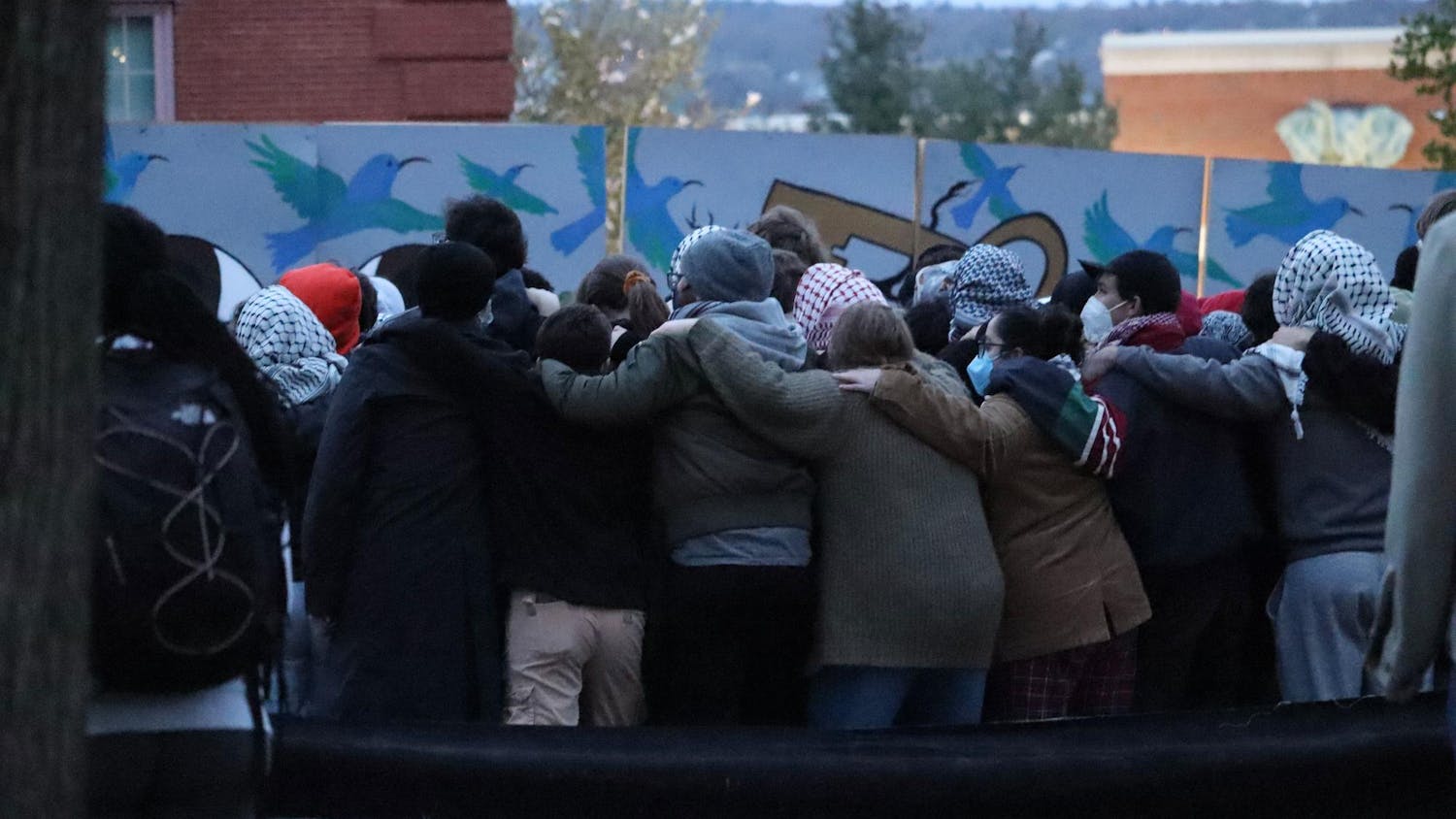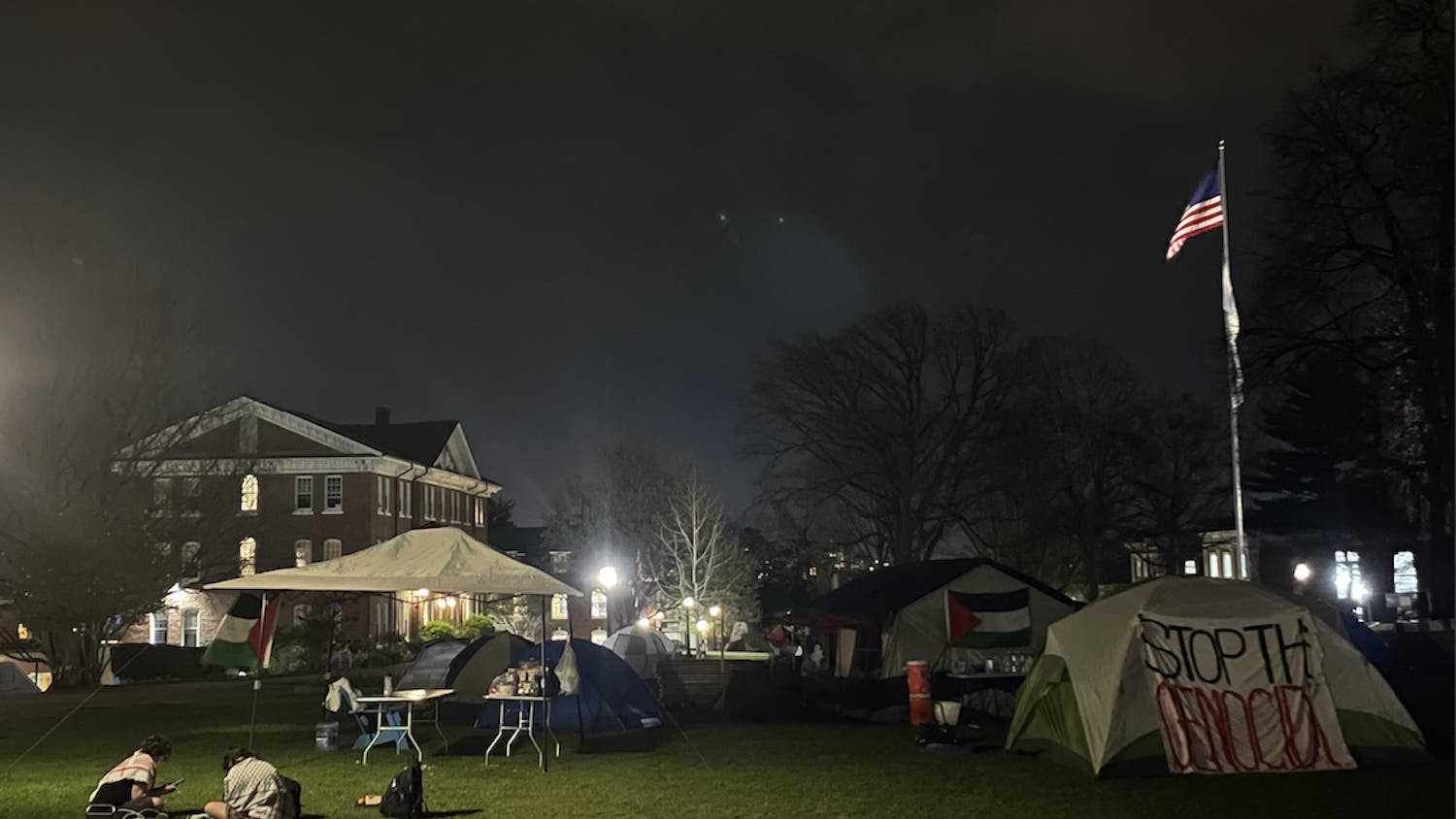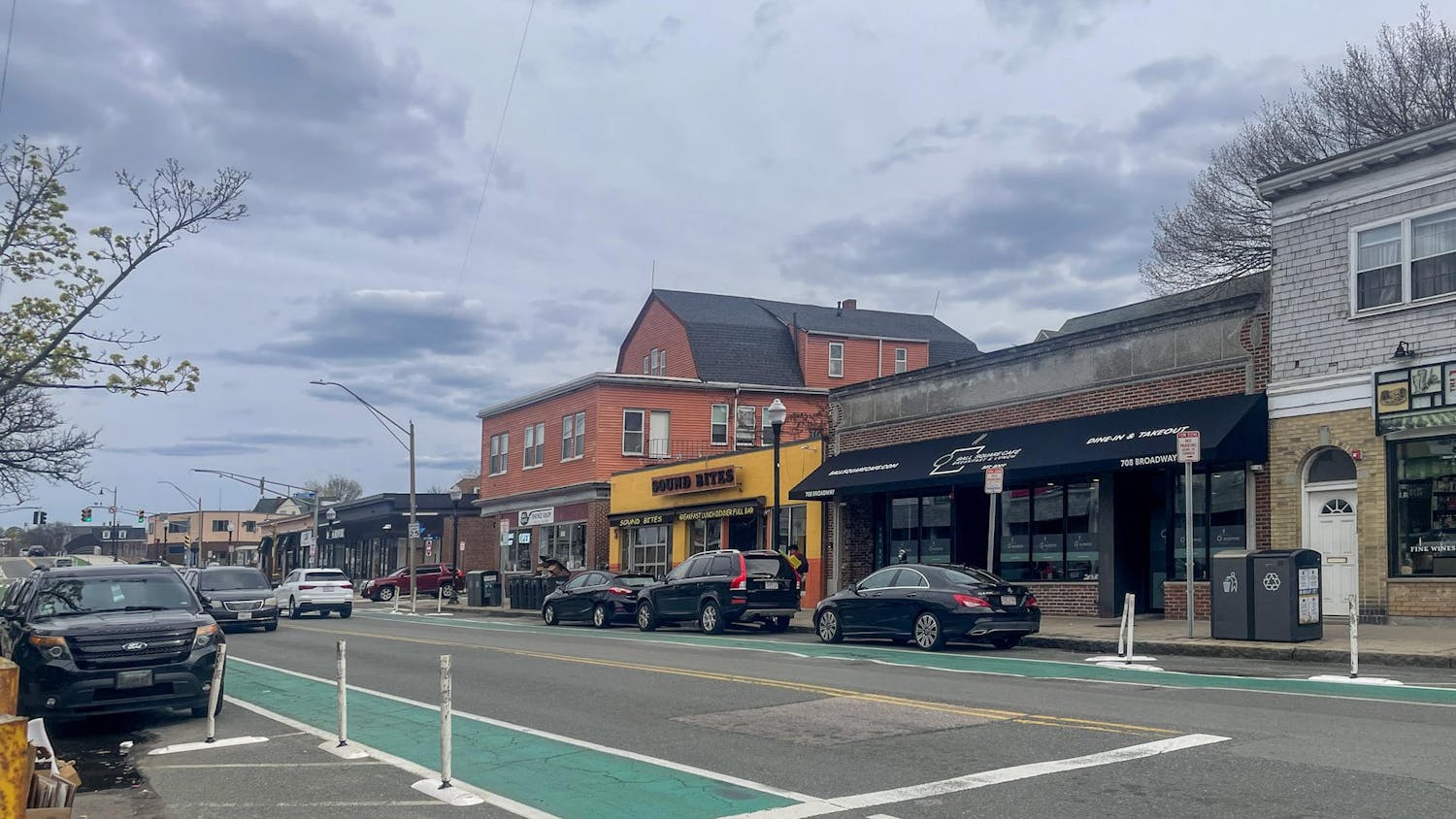More than 200 students and workers gathered Friday afternoon in support of the dining workers’ union, UNITE HERE Local 26, which is in negotiations for a contract with the university administration. Speakers at the rally called for shorter working hours, affordable health care, job security and fair treatment in the workplace. Demonstrators included students, dining workers, teaching faculty and union representatives.
According to Tufts Dining Action Coalition’s (TDAC) Facebook event, the rally was organized due to a feeling that negotiations over the contract were moving too slowly and that the administration was not willing to guarantee basic items.Negotiations between the union bargaining committee and the administration began in August, four months after the workers voted to unionize. Since then, there have been seven meetings totaling nearly 30 hours of bargaining, according to Trisha O’Brien, who identified herself as the union negotiator, and Jesse Ryan, a sophomore and organizer for TDAC.
The rally assembled outside of Dewick-MacPhie Dining Center around 3:30 p.m. Demonstrators brought signs that carried messages of unity and gratitude such as “We support dining workers,” “Thank you for feeding us” and “Unbreakable.”
After being addressed briefly by Edwin Jain, a senior and organizer for TDAC, the crowd began marching north on Latin Way toward Ballou Hall. The demonstrators turned west on Professors Row before turning north again on Packard Avenue. Tufts University Police Department blocked traffic at intersections while marchers passed through. The march ended in front of the north entrance of Ballou Hall.
Members of the Tufts dining workers’ union led the crowd in chants, which included “What do we want? Contracts. When do we want it? Now,” and “No discrimination. We’re a union nation.”
The path and structure of the march were reflective of a rally that occurred on Apr. 3 in support of the dining workers' unionization. According to TDAC member Andrew Jefferies, however, Friday's rally served a different purpose.
“It’s a slightly different messaging," Jefferies, a senior, said. "In April, it was like: ‘We are the workers, we organize, please recognize us.' Now it’s ‘Listen to us, we’re not asking for anything unreasonable.’”
According to Ryan, the rally in April was mostly led by student organizers, while dining workers planned and led Friday's rally.
“[At] last year’s rally, we had 10 to 15 workers there, but this year, there [are] going to be 90 to 100 workers,” Ryan said in an interview before the rally.
O’Brien said workers played a larger role this time because they were more confident after the 127–19 vote in favor of unionization on Apr. 24. She also noted that workers feared retaliation from managers and bosses if they publicly supported the organization effort in April.
“A lot of the staff were scared last time,” O’Brien said in an interview after the rally. “They were afraid to speak.”
In front of Ballou Hall, a lineup of speakers that included workers, students and faculty addressed the crowd. They listed the dining workers' demands such as shorter working hours, affordable health care, and giving full-time benefits to temporary workers.
In an interview with the Daily after the rally, Vincenza Navarra, a dining worker, said that working long shifts strains her family. Navarra explained that the union is pushing the administration to shorten work schedules to avoid such strain.
“We need a contract now so that we can have a better life for our families. We need less hours," Navarra said. “We need respect, too.”
During the rally, workers said that they experience harassment and verbal abuse from managers, which has had a negative impact on the working environment. O’Brien said that the working conditions differ greatly from when she joined Tufts Dining Services 30 years ago.
According to O’Brien, the change is attributed to the conduct of the Dining Services managers and to understaffing, which has led to longer working hours and a strenuous working environment. She said that Dining Services has not done enough to address the issue since she and other workers raised the issue with Dining Services management, as well as the university administration.
“In the past five or six years, they don’t care about staffing. We are so understaffed — it’s ridiculous,” O’Brien said in an interview.
Another issue raised by the demonstrators was the status of temporary workers. Temporary workers are not considered full-time staff and do not receive benefits like health care, vacation days and personal days, according to O’Brien. She said that there are over 40 temporary workers employed by Dining Services, some of whom have worked for Dining Services for more than a decade.
Tina Lavanga, a worker at Hotung Café, addressed the crowd on behalf of temporary workers. According to Lavanga, some temporary workers work 40 or more hours per week. She said that she began working for Tufts Dining eight years ago and that she enjoys its friendly atmosphere but that she needs to have job security. Lavanga explained that every August, she waits for a letter to come in the mail that invites her to return to work.
“I want to work for Tufts as a permanent part-time worker,” Lavanga said. “For my co-workers [who] work 40 hours or more ... I want them to be permanent employees.”
Lavanga said that because temporary workers do the same work as permanent employees, they should receive the same benefits and treatment. Policies regarding temporary workers affect a large fraction of the dining staff. Between one-fourth and one-third of dining workers have temporary working status, according to Mike Kramer, a union representative.
Other speakers at the event included students and faculty who spoke in support of the dining workers’ union. Students shared personal stories and thanked the dining workers, vowing to "support [dining workers] them for as long as [the students] are here."
First-year student Fiona Davis-Walsh said she attended the rally to push the university to adopt a fair contract.
“The dining workers are an integral part of our community,” she said. “We owe it to them to show up and pressure the administration.”
Rabbi Jordan Braunig, director of the Initiative for Innovative Community Building at the Granoff Family Hillel Center and part-time lecturer in Judaic Studies, addressed the crowd on behalf of Tufts' faculty. He said supporting the dining workers’ union was a way to encourage community at Tufts.
“For community to be real, it has to encompass everyone," Braunig said. "That means the custodial staff, the faculty, the adjunct faculty, facilities — it means everyone that puts their life and their labor into [Tufts].”
To Grazia DiFabio, a dining worker, a fair union contract means holding managers accountable and ensuring higher wages and shorter working hours.
“Management needs to be professional,” DiFabio said. “A fair contract means a fair schedule, a living wage and the ability to put family first.”
Tufts' Executive Director of Public Relations Patrick Collins told the Daily in an email that progress is being made during union negotiations.
"The university and the union began in-person negotiations in August and have initially focused on a number of important issues such as training, safety, job postings and work assignments," Collins said. "We continue to make progress and appreciate the engagement of all parties at the bargaining table. Negotiations for a first contract involving a new bargaining unit such as the dining services employees’ union often take a good deal of time. We are hopeful that we will be able to reach agreement as soon as possible."
Correction: A previous version of this article inaccurately represented the number of people at a Nov. 16 rally to support dining workers' unionization efforts as over 100. More than 200 people were present at the rally. The article has been updated to reflect this change. The Daily regrets this error.
Dining workers, students rally to support union contract negotiations

Tufts dining worker Lucson Aime speaks at a rally in support of a fair union contract in front of Ballou Hall on Nov. 16.





